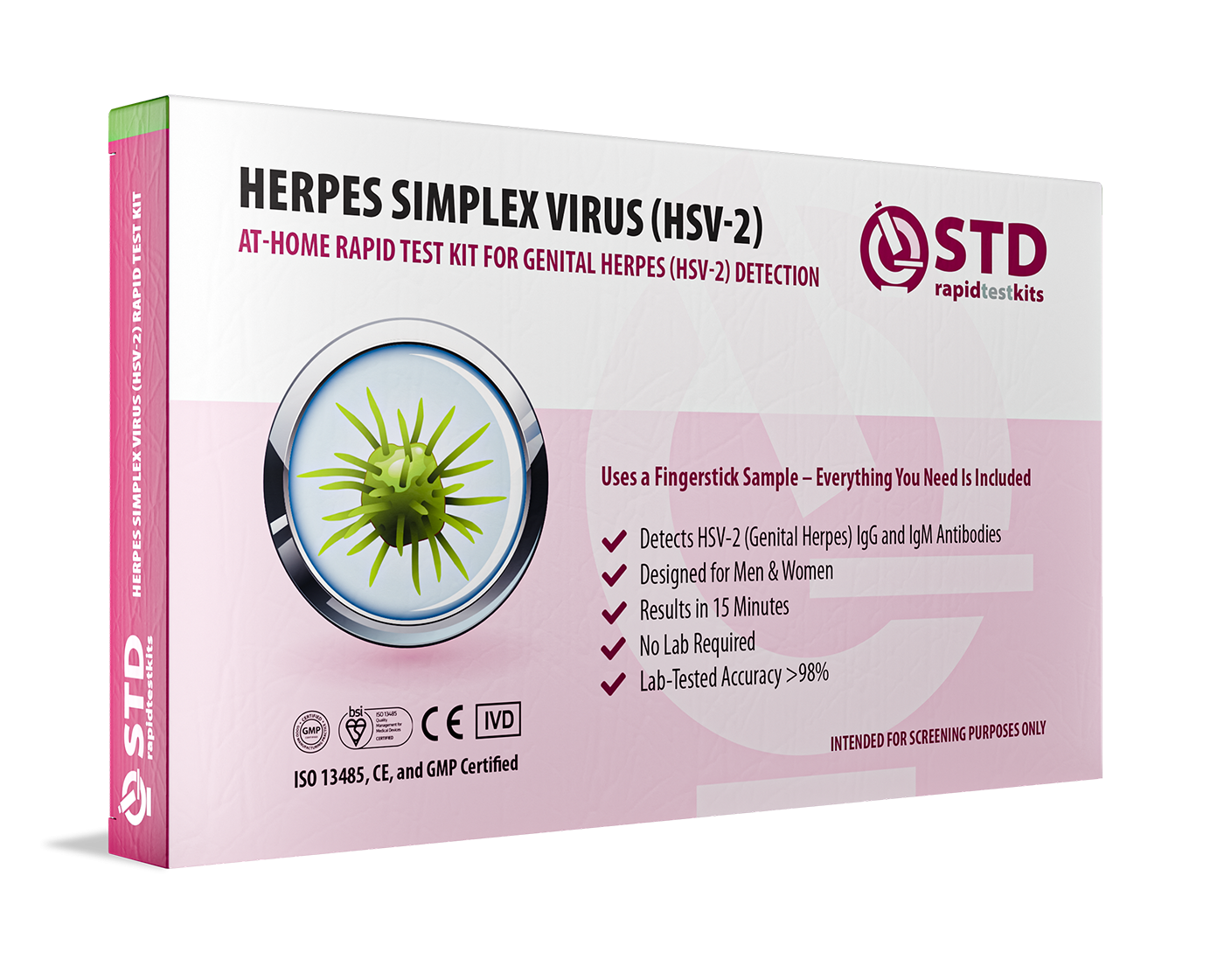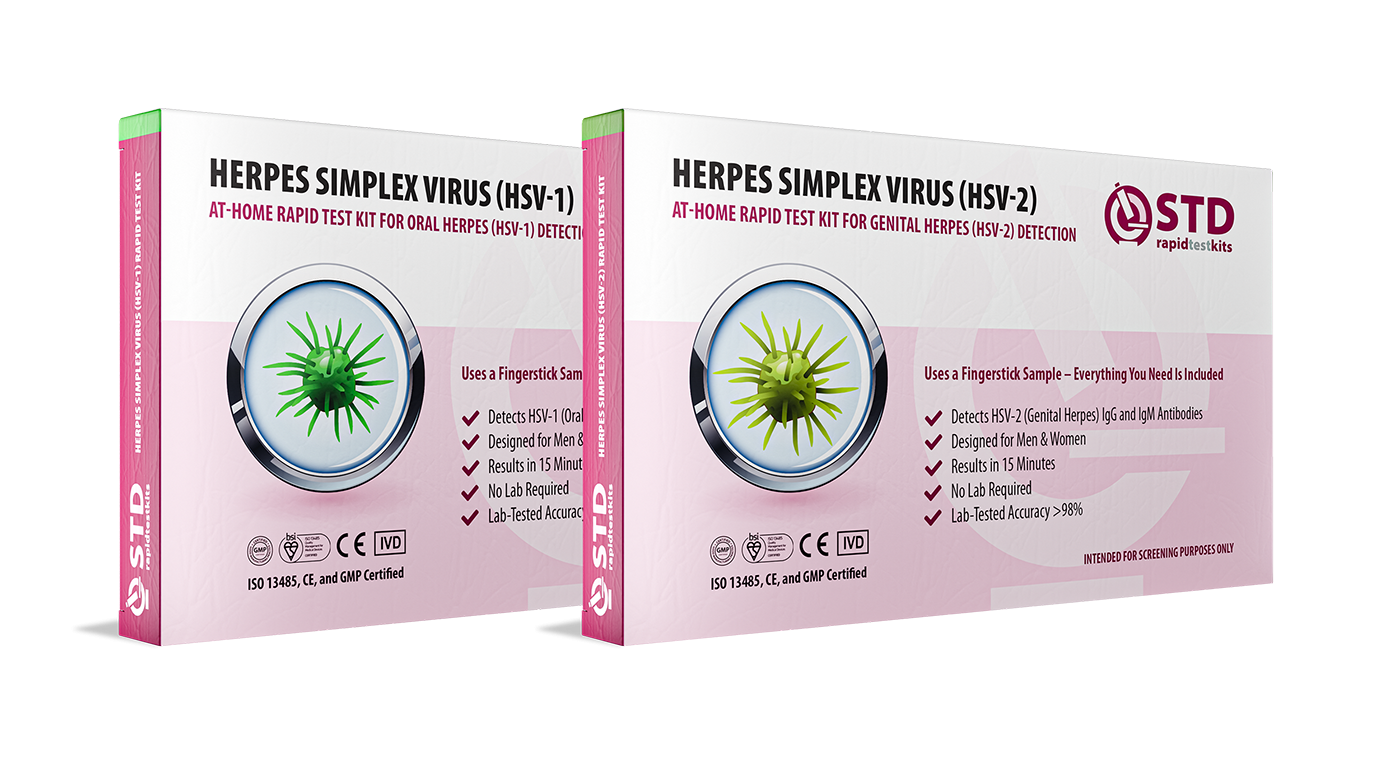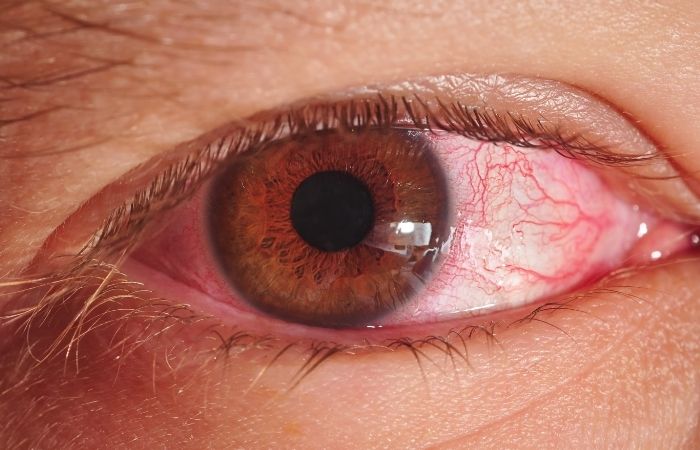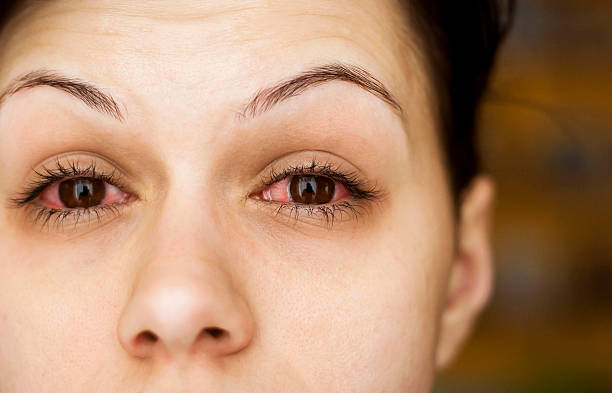Short answer: Yes, you can get an STD in your eye, especially ocular herpes (HSV-1 or HSV-2). It can look like pink eye, but it might also cause pain, blurry vision, or sensitivity to light. A quick diagnosis is very important to keep your vision from getting worse.
This Isn’t Just Pink Eye, And Here’s Why
People often get pink eye (conjunctivitis), which is usually caused by allergies, bacteria, or viruses. But herpes in the eye, which is also known as ocular herpes or herpes simplex keratitis, can cause the same symptoms but do a lot more damage.
Here’s how they compare:
- Pink Eye: Itchy, red, watery, often affects both eyes, mild discomfort
- Ocular Herpes: Feels like sand in the eye, sensitivity to light, blurry vision, may affect only one eye
Eye herpes can result from touching your eye after oral sex, kissing someone with a cold sore, or transferring the virus from your mouth or genitals. HSV doesn’t need a visible sore to spread, it can transmit during asymptomatic shedding.
“I thought it was just allergies, but it got worse fast. My doctor said it was herpes in my cornea.”, Devon, 26
If one eye feels weird, gritty, painful, or overly sensitive to light, consider testing for herpes. Eye infections need fast treatment to protect your vision.

People are also reading: Foreplay Isn’t ‘Safe’ By Default: STD Risks People Don’t Talk About
What Is Ocular Herpes, Really?
The herpes simplex virus (HSV) can cause an eye infection called ocular herpes. Most of the time, HSV-1 (the virus that causes cold sores) is to blame, but HSV-2 (the virus that causes genital herpes) can also spread to the eye through fluids or contact with the eye.
It can have an effect on different parts of the eye:
- Conjunctiva: Looks like pink eye
- Cornea: Causes herpes simplex keratitis, which can leave scars or make you blind.
- Eyelid: Redness, swelling, or tiny blisters near the lash line
A lot of people don't even know that herpes can live in the eye. But once it gets there, it can come back again and again, just like genital or oral herpes. Stress, illness, UV exposure, or wearing contact lenses can all set it off.
It can hurt your vision for good if you don't get treatment. That's why it's so important to get tested and start antiviral treatment right away.
How Eye Herpes Actually Happens
You don’t need to be reckless, or even sexually active, to get ocular herpes. It often comes from auto-inoculation, meaning the virus spreads from one part of your body (like a cold sore or genital area) to your eye, usually via your fingers.
Common transmission routes include:
- Touching your eye after oral sex with a partner who has HSV-1
- Rubbing your eyes after touching a cold sore on your lip
- Shared towels or contact lenses (rare but possible with poor hygiene)
- Infected genital fluid or saliva making contact with the eye during foreplay
“We didn’t even have sex. He had a cold sore, went down on me, and then I rubbed my eye later. That’s how it started.”, Alyssa, 24
This isn’t about blame, it’s biology. HSV is a highly contagious skin virus that can infect any mucous membrane, including the thin, delicate tissues around your eye.
Symptoms of Eye Herpes You Should Never Ignore
Ocular herpes can show up slowly or all of a sudden. It might look like pink eye at first, but there are some signs that it's time to see a doctor or get tested right away.
Look out for:
- One eye feels like it's burning or stinging.
- Feeling like something is in your body, like sand or grit
- Pain in the eyes or blurry vision
- Sensitivity to light (photophobia)
- Watery discharge or crusting around the eyelids
- Little blisters around the eye or lash line
Pink eye usually goes away on its own or with over-the-counter drops, but herpes needs antiviral drugs like acyclovir or valacyclovir. If you wait too long to get treatment, you could get corneal scarring or lose your vision.
If you’ve had a recent cold sore or sexual contact and your eye starts acting weird, get tested for herpes now. Better safe than sightless.
Check Your STD Status in Minutes
Test at Home with RemediumGenital Herpes Test Kit

 For Men & Women
For Men & Women Results in Minutes
Results in Minutes No Lab Needed
No Lab Needed Private & Discreet
Private & DiscreetOrder Now $45.99 $49.00
Ocular Herpes vs Pink Eye: What Doctors Look For
Most primary care doctors or urgent care clinics will assume it’s pink eye, unless you tell them about recent cold sores, oral sex, or STD exposure. That’s why self-advocacy matters.
Pink Eye (Viral or Bacterial):
- Typically affects both eyes
- Discharge is thick and yellow (bacterial) or watery (viral)
- Redness, itchiness, irritation, crusting
- Clears in 7–10 days without permanent damage
Ocular Herpes (HSV-1 or HSV-2):
- Usually one eye affected
- Light sensitivity, sharp pain, blurry vision
- Recurrent episodes, not a one-time infection
- Requires antiviral treatment, can lead to corneal ulcers
A simple slit-lamp eye exam or corneal swab can confirm ocular herpes, but not all providers test unless asked. A home herpes test can help confirm your exposure history if eye symptoms follow oral/genital contact.
How to Protect Yourself and Others
If you or a partner has herpes (oral or genital), there are ways to lower the risk of eye transmission:
- Don’t touch your eyes after sex, especially if fluids are involved
- Wash hands thoroughly before handling contacts or makeup
- Avoid sharing towels, washcloths, or eye drops
- Use condoms and dental dams during oral and genital play
- Disclose outbreaks: Avoid intimacy when cold sores or genital lesions are active
It’s not just about preventing eye infections, it’s about understanding that STDs can affect every part of the body, not just the genitals.
“I had no idea eye herpes was even a thing. If I’d known, I would’ve been more careful with my contact lenses after hooking up.”, Marcus, 32
Don’t let outdated ideas put your health, or your sight, at risk.
Yes, You Can Get Herpes in the Eye from Oral Sex
If your partner has a cold sore (even if it's not active) and performs oral sex on you, that HSV-1 virus can be transmitted to your genitals. If you later touch yourself and rub your eye, you can infect your own eye with herpes. This is called autoinoculation.
Many people don't know that oral herpes is just as risky as genital herpes, especially when it comes to unwashed hands and mucous membranes like the eye.

People are also reading: Dating Again at 45? The STD Risk No One Warns You About
How to Know If It’s Herpes or Something Else
Burning, redness, pain, those are symptoms of many conditions. So how do you tell the difference between ocular herpes and other eye issues?
- Pink Eye: Itchy and crusty but usually mild
- Stye: Swollen bump near the lash line, painful to the touch
- Allergy-related irritation: Affects both eyes, often seasonal
- Ocular herpes: Sharp pain, blurry vision, gritty feeling, and light sensitivity, usually one eye
When in doubt, get it swabbed. And consider a home herpes test to check your status, especially after oral or non-traditional sex.
What Happens If You Don’t Treat Eye Herpes?
Things are getting serious now. If you don't treat ocular herpes, it can cause permanent damage. If not treated properly, the virus can make the cornea inflamed (keratitis), which can lead to scarring, repeated flare-ups, or even blindness.
Potential complications:
- Corneal scarring
- Vision distortion or blurring
- Recurrent outbreaks
- Potential need for corneal transplant
Early treatment = eye-saving treatment.
Can You Still Wear Contacts?
Only with the help of a doctor. Contact lenses can make ocular herpes worse by trapping the virus against the eye, which speeds up damage to the cornea. Take out your contacts right away if you think you have an eye infection and wear glasses until an eye doctor says it's okay.
And please: never share lenses or solution.
Check Your STD Status in Minutes
Test at Home with RemediumGenital & Oral Herpes Test Kit

 For Men & Women
For Men & Women Results in Minutes
Results in Minutes No Lab Needed
No Lab Needed Private & Discreet
Private & DiscreetOrder Now $75.00 $98.00
For all 2 tests
Does HSV in the Eye Mean You Have Genital Herpes?
Not necessarily. Most ocular herpes cases come from HSV-1, which is the same virus that causes cold sores. However, HSV-2 (genital herpes) can also infect the eye through direct contact with infected fluids or hands.
Only testing can confirm what strain you have. HSV-1 is more likely in the eye, but both types need treatment.
Recurrent Eye Herpes: Can It Come Back?
Yes. Just like cold sores or genital outbreaks, ocular herpes can recur. Once HSV is in your system, it lives in nerve endings and can reactivate when your immune system is down.
Things that often set it off:
- Stress
- Exposure to the sun
- Changes in hormones
- Sickness or fever
If you've had eye herpes before, your doctor may give you an antiviral to take every day to stop it from coming back. This is very important for people who already have eye damage or who wear contacts.
How Long Does Eye Herpes Last?
With treatment, a mild outbreak may clear in 7 to 10 days. More severe infections (like corneal herpes) may take weeks and require intensive antiviral therapy, sometimes both oral and topical.
Without treatment? It may worsen fast. This isn’t one to “wait and see.” Get it checked early.

People are also reading: The Future of STD Testing: Telemedicine, AI, and At‑Home Kits
Who’s Most at Risk?
Anyone can get ocular herpes, but the risk increases for:
- People who get frequent cold sores
- Those who wear contact lenses (especially overnight)
- People with weakened immune systems
- Folks engaging in oral sex with partners who have HSV
Ocular herpes is more common than people think, and it doesn’t care if you’ve “had sex” in the traditional sense.
How Is Ocular Herpes Diagnosed?
Your doctor may use:
- A slit-lamp microscope to examine the eye
- A corneal stain to highlight viral damage
- Swabs to test for HSV-1 or HSV-2
You can also pair that with an at-home herpes test if you suspect broader exposure. This is especially useful if you’ve had oral or genital contact recently.
Can It Spread to Other People?
Yes. Ocular herpes is contagious during active outbreaks. You can spread it by sharing towels, touching your eyes, or kissing someone if the virus is also active in your mouth. Good hygiene is key:
- Wash your hands frequently
- Don’t share eye drops, towels, or pillowcases
- Avoid touching others' faces if you have symptoms
STDs don’t only live below the belt. This one stares you right in the face.
Check Your STD Status in Minutes
Test at Home with RemediumOral Herpes Test Kit

 For Men & Women
For Men & Women Results in Minutes
Results in Minutes No Lab Needed
No Lab Needed Private & Discreet
Private & DiscreetOrder Now $33.99 $49.00
FAQs
1. Can you really get an STD in your eye?
Yes. The most common is ocular herpes (HSV-1 or HSV-2), which can infect the cornea or surrounding tissues. It’s often mistaken for pink eye at first.
2. How do you get eye herpes?
Usually through autoinoculation, when the virus spreads from a cold sore or genital area to the eye via your fingers.Oral sex with an infected partner can also introduce HSV to the eye.
3. What does eye herpes feel like?
Burning, foreign-body sensation, blurred vision, redness, and light sensitivity.It often affects one eye and may resemble pink eye early on.
4. Is ocular herpes dangerous?
Yes.If untreated, it can cause corneal scarring, vision distortion, or blindness. Antiviral treatment is critical to protect eyesight.
5. Is eye herpes permanent?
The virus stays in your system for life, but symptoms can be managed.With treatment, outbreaks are less frequent and less severe.6. Can I still wear contacts?
6. Can I still wear contacts?
Not during an outbreak. Contacts can trap the virus and worsen infection. Always follow a provider’s guidance before resuming use.
7. How is it diagnosed?
Via eye exam, swab, or visual inspection with a slit lamp. You can also take a home herpes test to confirm recent exposure.
8. Can I spread it to others?
Yes. During an active outbreak, HSV can spread via towels, saliva, or touch. Good hygiene is essential.
9. How long does it last?
Most flare-ups go away in 7 to 10 days with treatment. It can stick around and cause problems if you don't treat it.
10. Does eye herpes mean I have genital herpes?
Not always. Most ocular herpes is caused by HSV-1 (oral herpes), but HSV-2 can infect the eye too. Testing is the only way to know which strain you carry.
Your Eyes Deserve Just As Much Protection
When we talk about STDs, we often forget the face. But your eyes are mucous membranes too, and they’re just as vulnerable to herpes and other viruses as your mouth or genitals.
If your eye is burning, red, blurry, or feels off after intimacy, especially oral sex, don’t shrug it off. It might not be allergies or pink eye. It might be something more serious.
Protect your body. Protect your vision. And get the clarity you deserve.
Get tested now, your future self will thank you for seeing the truth.
Sources
1. American Academy of Ophthalmology – Herpes Keratitis Overview
2. CDC – What Causes HSV (Herpes Simplex Virus) Keratitis
3. StatPearls – Herpes Simplex Keratitis (2024)
4. Medical News Today – Eye Herpes: Pictures, Symptoms & Types










